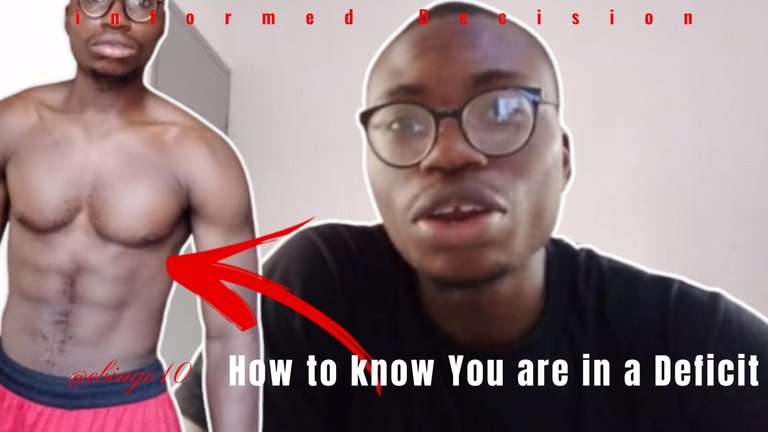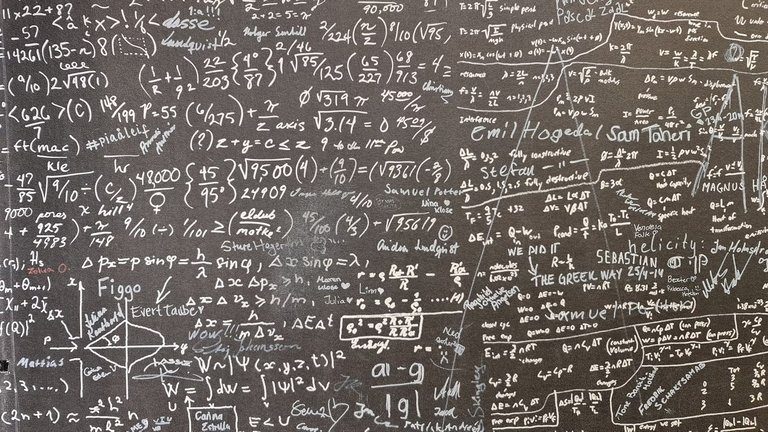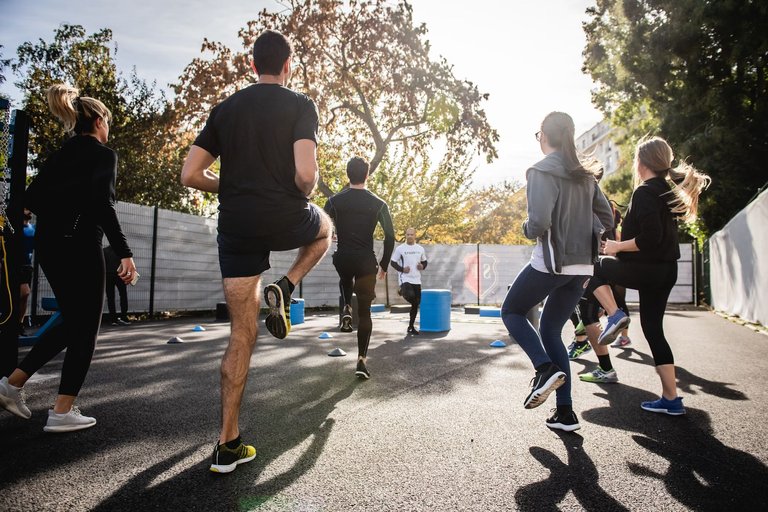How to Know You Are on a Caloric Deficit

Source: Phone image, Canva, and bg remover
transcript
Hello everyone, and welcome to Informed Decision with Dr. Lovet again, and today, we're going to be talking about how you can know that you are in a caloric deficit.
How do you know you're in a caloric deficit? How do you know you've been eating less than your body requires to meet up with your Basal metabolic rate and all the activities for the day? So, if you've been on a caloric deficit, what it means is that you have burnt up more calories than you put into your body.
So, how do you burn up more calories? Simply by breathing. As you breathe, you are burning up calories.
It's just like turning on a generator or turning on an engine and not moving the vehicle. Or it's like being in a coma.
If you're in a coma, you continuously burn energy even if you are not doing anything. So, that's your Basal metabolic rate then plus the activities that you've done.
So, if your Basal metabolic rate and the activities that you've done do not match up to the amount of calories you have taken in, then that means that you are most likely in a caloric deficit.
So, this is very, very interesting to me. I want to discuss this topic because it's kind of something that I'm going through right now. I've been tracking my caloric intake, my caloric usage for the whole day.
I had a BMI calculator. I calculated my Basal metabolic rate for the day and I also calculated how much energy I use up when I am not doing any activity. Like, I'm just chilling or you know, normal day, I just day. You understand?
The amount of calories I consume and then also I tried my best to note how much calories I use while I do certain activities. Like a 10-minute run.
How many calories am I burning on the 10-minute run? So, I use that to compare to things like jumping jacks. Like when I do five-minute jumping jacks.
Then when I also go to the gym and then work doing aerobic classes. And, this week I took aerobic classes. I'm going to do my best to show the videos.
So, I have two extra videos that I want to show you. I'm adding it to the clip. I'll be clipping it in. I'll be showing you the clips of the activities that I did.
My Activities for the day
So, this first video is going to be a video of me during my aerobic class that I took. I took a 30-minute aerobic class and after that 30-minute aerobic class, then we went for ab workouts.
After we did our workouts and we played volleyball, I still did a little bit of strength training because the week, I didn't feel like I got enough calf exercises and I also didn't feel like I got enough lat rows.
Like, I didn't do enough bar rows and I didn't do enough dumbbell rows. So, I took a little bit of time and I handled that.
I can't show you the video of that all I can show you and I'll be showing you right now so is the is theic that I did so that's going to be the next.
Okay, so throughout the period I was at the gym, I spent like maybe I spent close to 4 hours of we're just doing activity from activity to activity. So close sorry, close to 4 hours of activity.
So I'm thinking and I'm guessing that at least I burnt up to 1,000 calories. And I think I wrote everything down here.
Calculating My Calories For The Day

https://unsplash.com/photos/a-blackboard-with-a-lot-of-writing-on-it-OPpCbAAKWv8
So going into the day, as I started the day, I was already on a 300 calorie deficit from the last day.
So that's like my... it's like my closing account right over here, the balance. So I'm tracking my calories.
So the next day, I'm still on that 300 calorie deficit. So I went out and I started my exercise, but before going, I ate oat milk and... uh, oat milk, three eggs, and I think I added honey also, yeah, honey.
This is scribbling. So I ate oats milk and honey. I added up everything. All the calories and... then the three eggs, 210.
Everything was 700, about 700 calories. 150 + 240, that's 490, plus everything here was 490, then 210, so 700 calories.
Oat milk, honey. So you get the... you get the caloric value from the packet, the container, or the packet. So the oats packet, the milk packet, then the honey.
My honey didn't have an accurate measurement, so I had to get it online. So whatever you get online, you use that, all right?
So in the morning, I went for that 4-hour exercise. Now, I underestimated how much workout I might have gotten in in that 4-hour exercise.
It must have been... if I was doing constant exercise for 4 hours, it might be... it might be around 2700 calories, but I doubt it.
I cut that in half. My rule is you underestimate how much exercise you've been doing, and you overestimate your calories.
Always overestimate your calories and underestimate your workout. So then, in the afternoon, I got back home and I repeated basically everything that I ate, except okay, I didn't add the honey.
So I didn't add the eggs, so it was just 490 calories, just like this top part without the eggs. So it's 490, that was my afternoon meal.
Then in the evening, I had seven servings of rice with stew. So that's about 980. Jellof rice I saw online was 140 calories per seven, so I had seven servings of rice. I had seven spoons, and later I went back and I had two.
So I took note of all of that, and I took chicken. So you add all of that, and that's about... this was 430, plus 630 calories.
I wrote an "N" here because I'm also tracking my money, so that was a mistake, 630 calories. And then, plus the chicken, that's 730 calories. You add up everything from the day, and I had 1,800 calories.
Then I was on a 300-calorie deficit, so you subtract that. That's about 1,500. So now my BMR is 1,800 already, and then I have this exercise that I did.
I even tried my best to remove that there's 200 calories that is usually present for anybody on a 1,800-calorie deficit. If you check it online, that just by being sedentary, you burn 200 calories.
So I removed that. So if I took in 1,820 and I burned 1,200, 1,800 calories, what's left is just 20. So you subtract that, so you subtract that 20 from 1,350.
And what you have is... this supposed to be 1,320, this to 1,330 rather.
So you subtract that 300 from 1,360, and I don't know how I'm getting these values. This is 1,630, not 1,600 and 30. That's balance. Anyway, so that's an error, but you get it.
It's not an exact mathematics. I'm not trying to get an exact mathematics, but I'm just trying to get like a close enough value of the amount of deficit.
All right, so now that you have gone through all of that with me, let me tell you about the four signs that show that you are on a caloric deficit, that you can know, and you can use it to balance out what you are seeing on your book or your tracker or whatever you're using to monitor your caloric intake and caloric usage throughout the day.
How You Know You Are in a Deficit

https://unsplash.com/photos/koala-sleeping-in-the-tree-GNUcUx-iObg
Change in body composition
All right, so the number one thing is a change in your body composition. You notice that you are losing a little bit of fat. Your clothes... your clothes fit differently. You understand?
They feel a bit looser and all that clothes that you were struggling to get into all of a sudden you're fitting into them really quick. And that's one way that you can use to know.
It's very, very objective because clothes don't change unless they are really elastic. They're not supposed to change; their measurement stays the same.
So if you were squeezing into a particular cloths and all of a sudden now you are fitting into it very quickly, you notice that there are a lot of gaps and all of that, you... it's one way, it's one sure way to know that you have been on a deficit.
So for me, I kind of feel that my... currently, this vest is not fitting as tightly as it usually would. All right, so another thing is hunger.
Hunger
So you feel hungry when you're in a caloric deficit. Like, weirdly, I haven't been... I have been dealing with hunger a little bit differently from the way I usually deal with hunger in the past.
I'm not trying to starve myself, but at the same time, I'm not afraid of hunger. There was a time when I was operating on this fear hunger mentality where I was running away from being hungry, so I always try to eat before I get hungry.
But now I get hungry and then I eat. I'm not running away from it. Also, those times I kind of didn't have a lot of food pre-made or pre-ordered or pre-bought, which is kind of good now because I know I have food.
All I need to do is just prepare it or serve it for myself. And those are all the things that are important to me.
So that's how you... that's how you can evaluate in terms of how much attraction you're having to food.
Reduced Energy
All right, next thing is your reduced energy levels. So when you are hungry, you tend to have reduced... or when you're in a caloric deficit, you tend to reduce the amount of activity. Your energy levels are just low.
You're trying to adjust to that caloric deficit, so you start to reduce the amount of activities, which brings me to the last point. Your energy is also going to be reduced.
It's going to show in your tracker. It's going to show in the way you move. So your movement is going to be reduced. You're going to be reducing the amount of movement.
It's just like an adaptation to the fact that you are currently on a caloric deficit. So those are the four ways that you can know that you are on a caloric deficit, anyway. So this is the end of the video. I hope you've learned something from it.
I hope you are able to learn how to track your calories from watching how I did it with my scribbling 'cause I can't accurately be writing and putting in all these things into order.
So get out there, do your thing. Don't let anybody stop you. My... my phone is about to die, even if the person trying to stop you is you. Peace.
Like and follow for more. Share this video with anybody you think might need it. And um, stay tuned for the next episode.
I will be doing a video on something more medically related. The next video is more medically related, so stay tuned for that if you want to learn a little bit more about medicine and medical-related stuff. All right, so peace.

I fast a lot, and I am also constantly doing Keto every now and then so I'm very familiar with the concept of caloric deficit.
What people don't understand is that yes, exercise is key to lose weight but the way we eat is 80% of the work!
If you can't see this awesome banner, open this post InLeo
True, the vehicle through which you get their calorie control. The car you pick is dependent on the brand you like the most.
Being on a keto diet is awesome. I usually like people to stick what is available and sustainable
Yeah and the cool thing about keto is that it also keeps me very sharp minded and focused, whereas when I eat carbs i feel all drowsy and tired all the time
By the way friend, have you heard of the frontend called inleo? It's very much like hive.blog but you can earn a little bit more rewards, let me know if you are interested in learning more about it!
Thanks for your contribution to the STEMsocial community. Feel free to join us on discord to get to know the rest of us!
Please consider delegating to the @stemsocial account (85% of the curation rewards are returned).
You may also include @stemsocial as a beneficiary of the rewards of this post to get a stronger support.